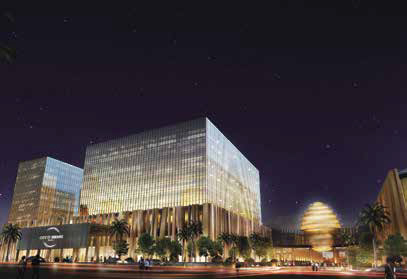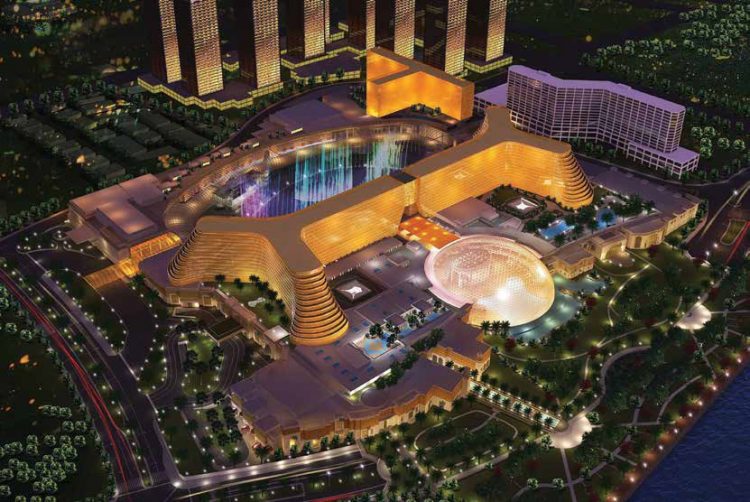Manila’s ramping up in a big way — but when?
Kazuo Okada’s Manila Bay Resorts super-casino will open late in 2016—that’s the latest from the company charged with running it, and it means the debut of the US$2 billion project is facing upwards of a year’s delay. Until recently, statements from Tiger Resorts Leisure and Entertainment, the subsidiary created to operate the complex for Mr Okada’s Universal Entertainment, indicated a 2015 first-phase opening, the most recent of those statements published at the end of last month by the Philippine Daily Inquirer, which said preparations were under way for recruiting some 8,000 workers.
“We are trying very hard to open by the end of next year,” the newspaper quoted Matt Hurst, executive vice president for casino operations and marketing, who also said the resort was in talks to bring a number of luxury brands to its 7,500-square-meter retail mall.
The story also quoted Adrian Ort, who is heading hotel and food and beverage and who elaborated on the resort’s plans for 1,000 hotel rooms in the first phase.
Yet, Mr Ort at that point already had spoken to Reuters, which ran a story the same day in which he said Tiger expects the first phase to open “only in late 2016”. He didn’t explain the delay, the news agency said.
Mixed signals also surround the opening slated later this year of Melco Crown Entertainment’s $1.2 billion , 950-room City of Dreams Manila after one of the project’s Philippine principals recently told the Inquirer, “We will open in November,” only to have Melco Crown issue a statement with the Philippine Stock Exchange the same day denying that any specific opening date had been set.
Both resorts are located at a nascent tourist hub on Manila Bay called Entertainment City, a special government-sponsored district designed to create jobs and spur investment by attracting big spending travelers and gamblers from China and the greater Asian region with four destination-scale casino hotels. The first of these opened last March—the $750 million Solaire Resort & Casino, which also plans to complete an expansion of its hotel and amenities mix by the end of this year.
Of course, where big casinos with major resort components are concerned, opening dates tend to be moving targets under the best conditions, and the blueprint for City of Dreams certainly is big. Plans call for six hotels at full build-out, three in the first phase: a Crown Towers, a Hyatt and Asia’s first hotel bearing New York City’s wellknown Nobu brand. There will be sizable entertainment, retail and restaurant attractions. The casino will feature some 365 live table games and more than 3,000 machine games.
The fourth Entertainment City casino, Bayshore City Resorts World, will be similarly expansive—and it, too, has danced around a number of on-again, off-again opening dates, though construction has broken ground and the project now appears solidly headed for a 2018 debut, albeit two years later than initially planned.
The licensee is Travellers International Hotel Group, the partnership between Philippine tycoon Andrew Tan and Genting Group subsidiary Genting Hong Kong that runs the country’s largest and most lucrative casino, Resorts World Manila, located near the city’s international airport and not far from Entertainment City. Plans for Bayshore City call for 1,500 hotel rooms to be managed by Okura, Westin and Genting and an array of non-gaming attractions befitting a destination resort. The price tag at this point is $1.1 billion. Travellers says construction will start “within a year”.
The rationale for possibly delaying Manila Bay Resorts is understandable for different reasons, all of them tangled up with the inability to date of Mr Okada’s Philippine subsidiaries to comply with a requirement under Philippine law that restricts foreign ownership of land rights to 40%. Negotiations with a number of local land partners have fallen through, and the latest, involving Century Properties Group, a Philippine developer, is mired in litigation that currently prevents Mr Okada from seeking fresh partners.

Complicating this are allegations that Mr Okada and a number of Philippine and Japanese nationals affiliated with him had set up straw companies to evade the ownership requirement. Intertwined in this controversy is an alleged bribery scheme involving a prominent local businessman, the government’s former top gaming regulator and others.
Mr Okada’s Philippine troubles cost him both his seat on the board of directors of Wynn Resorts, a company he helped found, and his considerable stake in the company, though he and his affiliates deny any wrongdoing and have maintained that Manila Bay Resorts is moving ahead toward an opening in 2015, a forecast that now looks to be in doubt.
When it does open it will be on the largest plot assigned to the Entertainment City licenses—44 hectares, for which plans call for 1,000 hotel rooms in the first phase, a domed pool with a Las Vegas-style nightclub and beach club, a luxury spa, 22 restaurants and a 30,000-square-meter casino with 500 table games and 3,000 machine games.
However, the Philippine government has stated repeatedly that it will not be permitted to open until the land ownership issue is resolved.
Mr Okada, in the meantime, is fighting Wynn’s actions against him and that dispute is in litigation in the US.





























